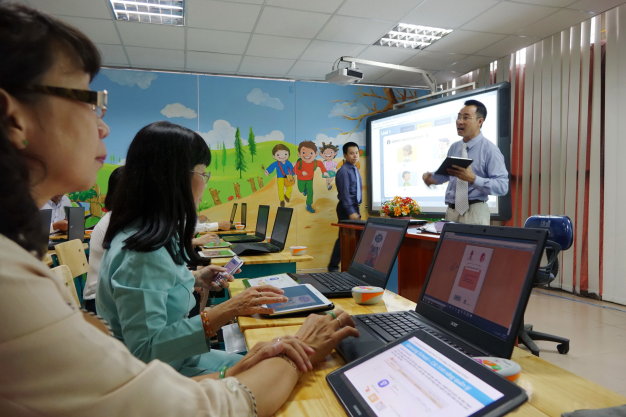A plan proposing to introduce more than 326,000 tablets to 1st, 2nd and 3rd graders in Ho Chi Minh City has been loudly rapped after it was presented at a seminar held in the southern city on August 18 by the HCMC Department of Education and Training.
According to the plan, which is part of a project to pilot new teaching methods with e-textbooks in elementary schools in HCMC for the 2014-2015 academic year, local 1st, 2nd and 3rd graders will study in ‘smart classes’ where traditional textbooks are replaced by modern tablets integrated with e-textbooks.
The plan will be launched at 451 schools in the city in the upcoming school year, which will officially open early next month, if it is approved. The city’s budget will sponsor tablets for 5,334 disadvantaged students and parents of the remaining number of more than 321,000 have to buy the devices costing from VND3 million (US$141) to VND5 million ($235) each for their kids themselves.
The HCMC Department of Education and Training said it will take into account all the opinions to make a complete report about the plan to the city’s leaders.
Speaking at the seminar, Le Hong Son, director of the department, said the project targets to bring the model of ‘smart classes,’ which are very popular in other countries as well as international schools in HCMC, to public schools.
“We are facing many conflicts, for example, we have a small budget but we are afraid of mobilizing money from people; we worry that our kids have to carry heavy bags to schools but also scared that tablets will hurt their eyes. We can do nothing if we hesitate to solve the conflicts.”
Children’s health – topic of debate
The plan has caught attention of local educators. Many of them noticed the effects of the project, but also had concerns over it. The most worrying issue is students’ health over the negative effects on human eyes while the project has not figured out how using tablets could affect children at the age of 6 to 8. Moreover, worries about how to control the way children use the devices as well as the safety for kids when they carry a multimillion-dong machine to school have also been raised.
An educator in HCMC said children at those ages need to learn with all senses and to practice as much as possible.
“It’s not OK to replace traditional textbooks with handset devices. Focusing using the machine will limit children’s connection with the world around them. They will mainly use two senses of vision and hearing,” he said.
Meanwhile, a principal of an elementary school said that the plan needs to consider how children could be affected carefully before it is piloted.
Nguyen Thuy Uyen Phuong, training director of the HCMC-based Tomoto school for children’s extracurricular activities, agrees that tablets could be an effective device to help children to study but she does not support the idea to launch the plan at this time.
“The plan has not proven its effect in terms of education. How could changing learning tools bring effects while our textbook system, curriculums, and teaching methods still have shortcomings?” she shared. “Moreover, launching it in the first grades of the elementary level is not reasonable. The thing children could learn from the tablets is how to use them, not information technology as we expect. At those ages, they have just started to learn texts, so using the modern machine is just like using a modern textbook at a many-times-higher price.”
Not only educators, but numerous readers also expressed their objection to Tuoi Tre (Youth) newspaper after the plan was announced. Many opponents agree that using tablets at very early ages could harm children’s health and the devices should be used for higher graders.
Reader Vu Thi Xoan wrote to Tuoi Tre, saying the plan should not be executed.
“It’s not right letting students at the 1st, 2nd and 3rd grade level use smart devices for studying. They will not have the ability to practice, think, and be creative. This project should be done at universities and colleges,” she expressed.
Also, reader Tran P. Thao said using tablets in elementary school is unnecessary.
“Children at those ages are hyperactive, they may break the electronic devices, not to mention that tablets can affect their vision. I see developed countries still using blackboards,” she commented. “Instead of wasting money on equipping tablets, we should focus on improving textbooks and curriculums.”
In addition, some opinions said convincing parents of more than 321,000 students to spend millions of dong buying tablets for their kids instead of thousands of dong for traditional paper books is not an easy task.
Like us on Facebook or follow us on Twitter to get the latest news about Vietnam!




















































